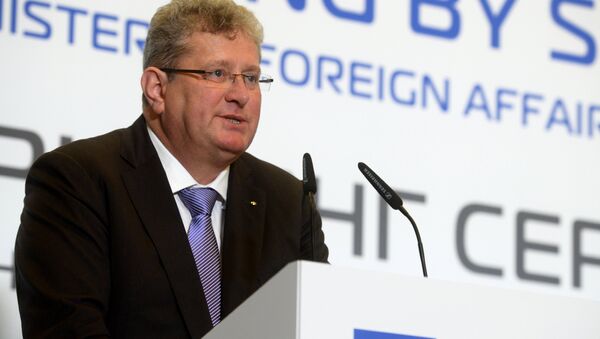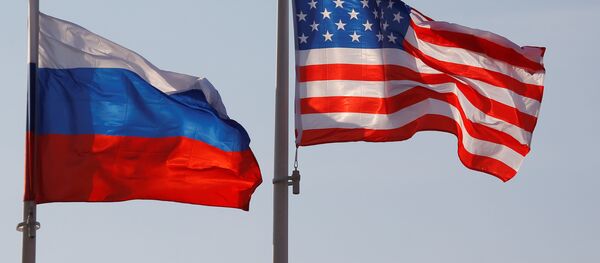MOSCOW (Sputnik) — The EU business presence in Russia remains strong as entrepreneurs are optimistic about the Russian economy bouncing back to pre-crisis levels, according to Association of European Businesses (AEB) chairman Tomas Staertzel.
"The EU market represents 43 percent of Russian foreign trade during the first seven months of 2017. The EU business community remains strong and stable in Russia. The comprehensive AEB survey shows that the EU business [community] is positive about Russian economic growth. The AEB-GfK index grew 21 points in 2017 and stands at 144 out of 200 points reaching the level of 2013," Staertzel said at a briefing with Russian Foreign Minister Sergei Lavrov.
According to President Vladimir Putin, Russia’s economic revival has become sustainable, and the country's economy has ended its period of stagnation. The president pointed out that Russia's gross domestic product had been increasing for four consecutive quarters, exceeding a 2-percent growth rate since the second quarter alone.
At the same time, Staertzel said that the EU firms were worried about new sanctions against Russia.
"We have to wait for the clarification to understand to what extent the EU business in Russia will be affected. AEB is working for liberal trade and peaceful cooperation between countries and we think that these sanctions will definitely affect the EU business in general and those businesses that operate in Russia negatively especially the energy and transport sectors," Staertzel stated.
The chairman stressed that the AEB would continue to defend the EU firms' interests adding that the association was preparing to inform its members about sanctions' risks and effects for the different countries and sectors of their economies in the near future.
The association's CEO Frank Schauff, in his turn, has noted that the EU business sector was worried about new US sanctions against Russia.
"The US sanctions, which were decided upon in summer and where we are expecting some more explanations in the coming weeks are the major concern for EU companies given the engagement of EU investors here in Russia and we have addressed with EU authorities in order to take up and defend the interests of EU investors," Schauff said.
The aforementioned sanctions signed by the US president into law in August, being a part of the "Countering America’s Adversaries Through Sanctions Act," is the most far-reaching anti-Russia sanctions seen since 2014. Among other areas, it targets Russian energey projects with EU partners, which has already prompted criticism from a number of European states, including Germany.
READ MORE: New EU Legal Norms for Nord Stream 2 Could be Political Discrimination — Lavrov
Most lately, the US State Department published a list of almost 40 Russian defense and intelligence entities targeted by the expansion of sanctions. The list included the Federal Security Service (FSB), the Foreign Intelligence Service (SVR), the Main Intelligence Directorate of the General Staff of the Russian Armed Forces (GRU), as well as Rosoboronexport, Rostec and United Aircraft Corporation.


